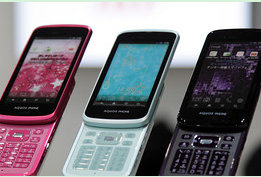(单词翻译:单击)

The first floor of the Bic Camera electronics store, a mammoth eight-story building covering an entire block here, is ground zero for Japan's electronics industry.
日本家电连锁巨头Bic Camera在东京的门店是一幢八层楼的建筑,占满整个街区,这里的一楼堪称日本整个电子产业的风向标。
Flat-panel television sets, most bearing Japanese brands, have long filled the north end of the sales floor, where the store's best-selling products reside.
长期以来,Bic Camera一楼专门陈列最畅销商品的北区都是由平板电视机占据,其中大多为日本品牌。
These days, amid slumping sales, the rows of TVs are relegated to the store's cramped second-floor quarters to make room for hundreds of accessories for smartphones - specifically the distinctively non-Japanese iPhone from Apple Inc.
最近,由于销售迟滞,这些电视机被挪到了狭窄拥挤的二楼,让位于数百款智能手机配件,这里的智能手机具体是指明显并非日本品牌的苹果公司(Apple Inc.) iPhone系列。
The store's decision shows the what has befallen Japan's technology industry. Once-powerful electronics conglomerates, which bet it all on TVs and missed the smartphone wave, are on the outside looking in.
这种变化折射出日本科技产业的境遇。曾经盛极一时的电子业巨头们把宝都押在了电视机上,错过了智能手机发展的浪潮,如今只能无奈地袖手旁观。
Smartphones are now playing center stage in the consumer-electronics world, not only delivering staggering sales growth, but also cannibalizing sales of digital cameras, portable game machines and other strongholds of Japanese electronics.
智能手机如今占据了消费电子产品行业的中心地位,不仅销售增长异常强劲,而且还挤占了数码相机、便携式游戏机和其他一些重要的日本电子产品的销售。
Today Apple and Samsung Electronics Co.'s are enjoying record profits and are combining for some 54% of global smartphone shipments in the first quarter, according to research firm Strategy Analytics.
如今,苹果公司和三星电子(Samsung Electronics Co.)赚取了空前的利润,根据调研公司Strategy Analytics的数据,两家公司在第一季度合计占全球智能手机出货量的54%左右。
The combined share for Sony Corp., Panasonic Corp., Sharp Corp., Fujitsu Ltd. and other Japanese manufacturers: 8%.
而索尼(Sony Corp.)、松下(Panasonic Corp.)、夏普(Sharp Corp.)、富士通(Fujitsu Ltd.)等日本厂商合计所占的份额只有8%。
In an effort to catch up, Japanese companies are redoubling their smartphone push with varying degrees of ambition.
不甘落后的日本企业怀着不同程度的雄心,加倍努力地发展其智能手机业务。
Sony is making the most aggressive move among Japanese brands after failing to dent the market in the past decade through its troubled Sony Ericsson joint venture. No longer bound to that partnership, Sony Chief Executive Kazuo Hirai has pledged to make smartphones a pillar of its business.
其中,索尼一马当先,步伐最大。过去十年,索尼未能通过其陷入困境的合资公司索尼爱立信(Sony Ericsson)在手机市场创出辉煌。现在,摆脱合作伙伴后,索尼的首席执行长平井一夫(Kazuo Hirai)立志要将智能手机发展为索尼的一大支柱业务。
Panasonic, Fujitsu and Sharp - the top three domestic handset manufacturers - are looking at a modest return to the global scene after all but backing out during the early age of so-called 'feature phones.'
三大本土手机厂商松下、富士通和夏普错过了“功能型手机”在全球的早期发展机会,现在也都在考虑适度回归国际舞台。
But a full-fledged global push won't be easy, especially in such a cutthroat industry that requires constant innovation.
但要在全球市场全面推进并不容易,尤其是对于这样一个竞争残酷、需要不断创新的行业而言。
'Both at home and abroad, we are in a tough situation' with smartphones, says Panasonic Managing Director Hideaki Kawai, who oversees the company's finances.
松下负责财政事务的董事总经理河井英明(Hideaki Kawai)说,在智能手机方面,“不论国内还是国外,我们的处境都很艰难”。
People in and outside the industry cite a number of factors for why Japanese companies missed the trend: Too much focus on the domestic market; too slow and inflexible to adapt to dynamic conditions; a misread of consumer preferences and a dose of arrogance about hardware superiority.
行业内外的人士指出,有一系列因素导致了日本企业错失良机:太过关注本土市场;对新形势觉悟慢、应变死板;对消费者偏好判断失误,对自己在硬件方面的优势过于自大。
Starting in the 1990s, Japanese cellphones were technological marvels packed with hardware breakthroughs. Sharp in 2000 was the world's first company to add a camera to a mobile phone.
从上世纪90年代开始,日本手机不断实现硬件上的突破,创造一个又一个的技术奇迹。2000年,夏普成为全球首家在手机中配置摄像头的企业。


